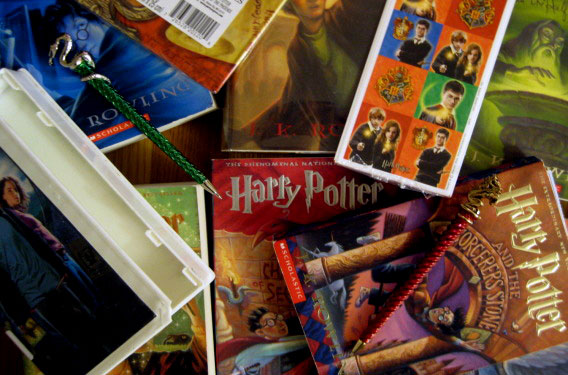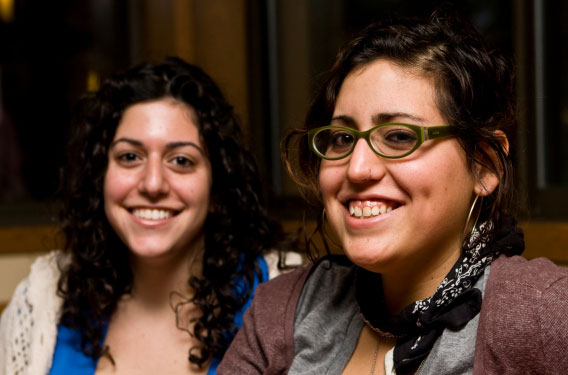Harry Potter and the Learning Spell
Two seniors make a lesson out of the magical series in an Ex College course
By Peter Bendix
Spanish 21. Intro to Community Health. Calculus II. Analyzing Harry Potter.
Wait—what was that last one? It’s not the answer to a what-doesn’t-fit question; it is, in fact, one of the classes offered freshmen this year through the Explorations program at the Ex College. That’s right—a class putting Harry Potter under the microscope, and for credit no less.

“We grew up with Harry Potter,” says Annye “Grace” Anderson, A12, one of the 14 freshmen who took the Harry Potter class. Photo: Taylor McNeil
Taught by seniors Sade Nickels and Inbar Sharon, the classes took place not in Hogwarts, the wizard school, but on the Hill. For three hours every Monday night during the fall semester, the topics ranged from mythology and gender bias to fanaticism and pop culture, all viewed through the lens of Harry Potter and company. “The most exciting part has been the topics that are unique to the books themselves—the best-selling aspect, the fanaticism, the magic,” says Nickels, a women’s studies major.
Nothing was off limits. “We had a class where we did some contemporary magic—palmistry, dream interpretation, astrology, tarot cards,” Nickels says. Unfortunately, because the two course leaders were not trained in occlumency, everyone in the class was still at risk of having an evildoer extract memories and feelings from their minds, but happily all survived anyway.
For the 14 freshmen in the class, Harry might well have been one of their classmates. “We grew up with Harry Potter,” says Annye “Grace” Anderson, A12. “We started reading the books when we were around 11, and he was 11, and they finished when he was 17, and we were 17. It was neat that the books matured as the character and the readers did.”
Anderson says the class opened her eyes to issues that she didn’t notice when she first read the books. “We talked about gender roles or racial hierarchy in the books—things I think I would notice now, but when you start when you’re 11, it doesn’t strike you immediately,” she says.
In one class, students read critical passages written from a feminist perspective, which argued that the books are marginally sexist and represent gender stereotypes. As an assignment, each student had to pick a chapter and highlight how events might have been different had Harry been a girl.
The class also had a lighthearted side. Many Explorations courses—one-credit classes that juniors and seniors can design, research and teach to freshmen—include games or activities to help the students bond. Nickels and Sharon put a twist on a well-known game.
They developed a Harry Potter-style “highs and lows” game, in which each person recounted the best and worst experience of their weeks, and called it “Patronuses and Dung Bombs,” in honor of the protective Patronus spell and the disgusting dung bombs in the books. And then there was the party, when everyone dressed up as a character from the book—the more obscure the character, the better.
The Love Song of Luna Lovegood
This might have been a class about Harry Potter, with party and all, but that didn’t mean it was child’s play. Students had weekly readings and several assignments throughout the semester, including a presentation in front of the class and a research paper. For their mid-term paper, the students chose topics ranging from the history of wandlore and broomsticks to analyzing Harry Potter as a case study for a bestseller.

Inbar Sharon, left, and Sade Nickels, teachers of the Harry Potter class. Photo: Alonso Nichols
Other projects included re-writing the epilogue, and writing fan fiction and songs. “One student had the idea to write love songs between some of the characters, and another to write obituaries from the seventh book of the characters who died,” Nickels says.
For those who have read the books, amusing possibilities abound: while it would be easy to compose love songs about Hermione and Ron, or Harry and Ginny, a particularly funny song could be concocted about Luna Lovegood and…well, anyone. On the other hand, a poignant obituary of the late Sirius Black, or a review of the pain-filled life of double-agent Severus Snape, would be illuminating.
The class rarely featured a “lecture” typically associated with many first-year courses. “Sometimes we explained things, but they’d have probably just fallen asleep if we lectured,” Nickels says. Instead, the course centered on discussions, sometimes about specific passages in the books, other times about general concepts. They also had a guest speaker one week, Paul DeGeorge, the lead singer of the rock band Harry and the Potters, which formed in 2002 in nearby Norwood, Mass. The band composes indie-rock music about Harry Potter, often from Harry’s point of view.
While the topic was interesting and the class was fun, teaching an Explorations class is no easy feat. “It is a lot of work, and the success of the class really depends on you as the figurehead of the class,” Nickels says. “You can’t prep enough,” adds Sharon, a religion major. “It’s impossible to predict anything.”
Of course, even with a tremendous amount of work involved, at the end of the day, Nickels and Sharon were glad to be teaching a class about Harry Potter, even if it made doing work for their “real” classes more difficult.
“I just wanted to work on Harry Potter class. I didn’t want to work on the other boring classes,” Nickels said with a smile.
Dumbledore, the Hogwarts headmaster, would be proud.
Editorial assistant Peter Bendix, A08, can be reached at peter.bendix@tufts.edu.
See http://www.tufts.edu/home/feature/?p=potter for another Harry Potter connection at Tufts.

